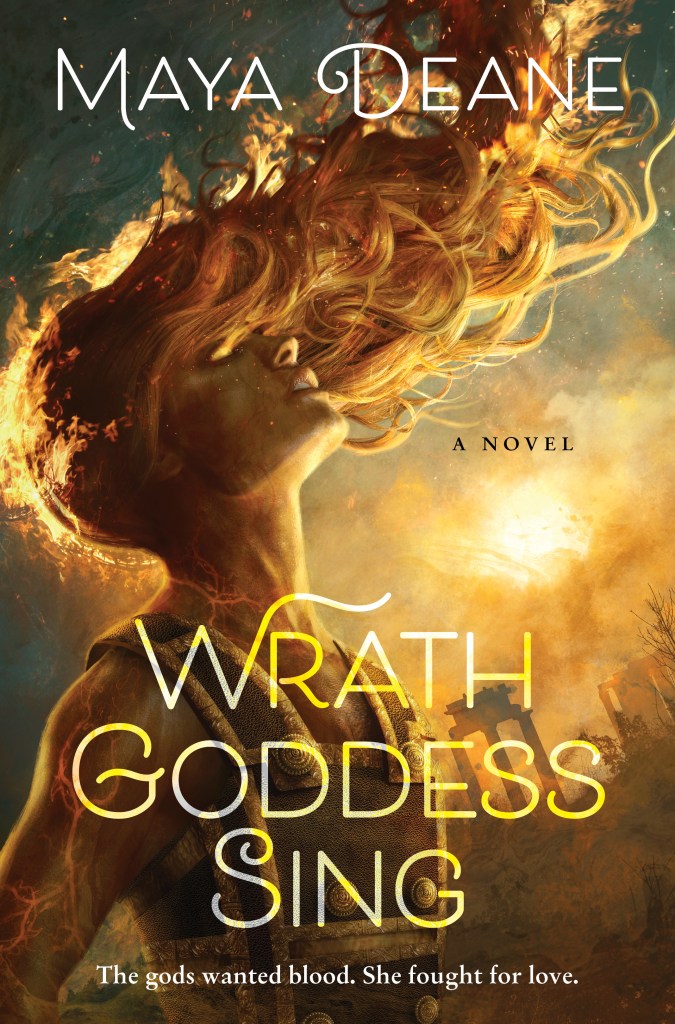
Genres: Fantasy, Epic Fantasy, Historical Fantasy, Queer Protagonists
Representation: Bi/pansexual trans MC, F/F, multiple secondary trans characters
Published on: 7th June 2022
ISBN: 0063161206
Goodreads

Drawing on ancient texts and modern archeology to reveal the trans woman’s story hidden underneath the well-known myths of The Iliad, Maya Deane’s Wrath Goddess Sing weaves a compelling, pitilessly beautiful vision of Achilles’ vanished world, perfect for fans of Song of Achilles and the Inheritance trilogy.
The gods wanted blood. She fought for love.
Achilles has fled her home and her vicious Myrmidon clan to live as a woman with the kallai, the transgender priestesses of Great Mother Aphrodite. When Odysseus comes to recruit the “prince” Achilles for a war against the Hittites, she prepares to die rather than fight as a man. However, her divine mother, Athena, intervenes, transforming her body into the woman’s body she always longed for, and promises her everything: glory, power, fame, victory in war, and, most importantly, a child born of her own body. Reunited with her beloved cousin, Patroklos, and his brilliant wife, the sorceress Meryapi, Achilles sets out to war with a vengeance.
But the gods—a dysfunctional family of abusive immortals that have glutted on human sacrifices for centuries—have woven ancient schemes more blood-soaked and nightmarish than Achilles can imagine. At the center of it all is the cruel, immortal Helen, who sees Achilles as a worthy enemy after millennia of ennui and emptiness. In love with her newfound nemesis, Helen sets out to destroy everything and everyone Achilles cherishes, seeking a battle to the death.
An innovative spin on a familiar tale, this is the Trojan War unlike anything ever told, and an Achilles whose vulnerability is revealed by the people she chooses to fight…and chooses to trust.
I received this book for free from the publisher via NetGalley in exchange for an honest review. This does not affect my opinion of the book or the content of my review.
Highlights
~do not read if you’re looking for Achilles/Patroclus
~do read for epically deadly trans woman Achilles
~and amazing Egyptian sorceresses
~never trust a god
~or a dolphin
There are books that strike you like a hammer against bronze, making you reverberate with their glory. Making you peal out your fierce, wild joy like the greatest and sweetest of shining bells.
Wrath Goddess Sing is one of those books.
*
It is theoretically possible than some other author could have put in the years of work and research that clearly went into every detail of Wrath Goddess Sing.
But no one else could have made this story as beautiful and as bold, as extraordinary and as entrancing, as poignant and powerful and profound as Deane has done.
With prose like a wine-dark sea, she sweeps us away into a rich, complex world like no other Trojan War retelling we’ve ever seen: one anchored in real Bronze Age history, weaving together so many unexpected threads, peeling back the…the polish, the Anglicisation of the tale we all know, to get at a story that’s never been told before.
Because we do all know this tale, don’t we? At least vaguely? Via any one of the dozens of film adaptions if nothing else? Maybe you’ve read other retellings; maybe you even studied The Illiad at school or at uni, like I did, and thus don’t really think Deane can take you by surprise. Not really. Not much. She still has to make Wrath Goddess Sing recognisably the story of Achilles, right? How different could it be from what we’ve heard before?
Spoiler: the answer is very. Wrath Goddess Sing is very different, and that took me by surprise and utterly delighted me. I’ve studied the Illiad! In an academic setting! For two years! I picked up Wrath Goddess Sing for a queer take on an old story, not expecting for one minute that Deane could really, genuinely work in twists and turns and takes that I not only hadn’t seen before, but also wouldn’t see coming.
But she absolutely did. She has done.
And it is breathtaking.
Here’s what I mean about peeling back the Anglicisation of the Illiad: if you do know a bit about the story of the Trojan War, there are names you’ll expect to see here – Paris is a big one, and so is his brother Hector. But there is no Paris, and no Hector, in Wrath Goddess Sing. For that matter, there’s also no Troy! Because all those names – of characters and places – they are the names that went into the English translations of the Illiad. But Deane has scorned all of that, and replaced it all with the original, historically accurate names and terms. A few are as we know them – Achilles, Odysseus, Sparta – and others are still recognisable – like Patroklos instead of the more familiar Patroclus. But many are as unfamiliar as the made-up proper nouns of a secondary-world fantasy novel, and honestly, I think that may be the best way to approach Wrath Goddess Sing: forget what you know, or think you know, about the Trojan War. Because this book will not map neatly onto your expectations. It’s much better to come to this story as though you’re opening up an original fantasy epic, where you know nothing and no one and everything is new to you.
That way your preconceptions can’t get in the way.
*
How are you supposed to describe a book like this? How can I possibly do it justice???
I want to geek the hell out and tell you that the title of Wrath Goddess Sing is also the first three words of the Illiad; I want to talk about the Easter eggs scattered throughout the book for Classics students, how I grinned like an idiot when I spotted Aphrodite’s son and screamed at the many-coloured coat; I want to gesticulate wildly as I explain just how much I love Deane’s take on the gods, how the same beings are cross-pollinated across multiple cultures and HOW AWESOME THAT IS.
This is a book that demands caps-lock, and also grand, epic poetry; I want to write hymns to it. I have sat down so many times to work on this review, and – have you ever heard the Earnest Hemmingway quote about writing?
‘There is nothing to writing. All you do is sit down at a typewriter and bleed.’
Trying to write about Wrath Goddess Sing is like that. It’s touched me so deeply, moved me so much, filled me with such fierce crowing joy that trying to talk about it is – it all overflows. If I could cut open my fingers and bleed over my keyboard, the oracles could divine everything I don’t know how to say in the raw wet red, but short of that… Words fail me.
Love is madness, she thought.
And in the grips of that madness, those who love become deadlier than the gods, and lose all rational fear.
It’s everything, is the thing. It has the most incredible prose, an incredibly human cast, magic and intrigue and danger. It’s a story about a mortal war that is simultaneously a war among the gods. It’s poetic and crude, brilliant and hilarious, intricate and deceptively simple. It will have you cheering and sobbing and laughing and gasping; it will give you chills and get into your dreams. It’s so beautiful. It’s so clever. And it’s a fucking battle-cry of a book, especially here, especially now.
Because yes, this is a queer book. A trans book. It doesn’t just feature a trans protagonist; it’s transgressive in its storytelling, in its approach to myth and history, in its underlying message. In its complete subversion of our expectations and assumptions and beliefs. In how, and what, it challenges and celebrates.
Wrath Goddess Sing doesn’t feel like a novel; it feels like magic, like something impossible, like Deane has stepped out of the world to show us a truth we had no idea was there. The only thing more impressive than the scope of her imagination is that she had the skill to pull it off, perfectly, and write a book worthy of her vision. I’m in awe.
And I guess I owe my old Classics teachers an apology, because I’ll never consider The Illiad the ‘real’ version ever again. Wrath Goddess Sing is too true to not be true.
They’ll be talking about this book long after they’ve forgotten The Illiad. Don’t miss it.





Leave a Reply